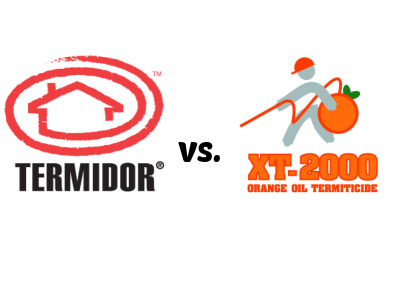Termidor vs. Orange Oil
 When it comes to spot or localized termite treatments, two of the most common options are Termidor and orange oil. How do they compare?
When it comes to spot or localized termite treatments, two of the most common options are Termidor and orange oil. How do they compare?
Orange Oil:
Orange oil’s active ingredient is d-Limonene, a byproduct of orange juice processing, extracted from orange peels. According to Jeff Chang from Florida Chemical, a major supplier of orange oil, the substance has chemical properties similar to turpentine. Orange oil kills termites by dissolving their exoskeletons, causing dehydration and protein loss.
Pros:
- Derived from natural waste products, making it an eco-friendly option.
- Low toxicity with no long-lasting chemical residues.
- Kills termites on direct contact.
Cons:
- Termites live in a colony with a caste system, including workers, soldiers, and a queen. Since orange oil only kills termites on contact, it may not reach the queen, allowing the colony to continue reproducing.
- Termites can detect the strong citrus odor and avoid treated areas, limiting effectiveness.
- A study mentioned in The IPM Practitioner (2008) found that orange oil dissipates within a week—providing no long-term protection.
- Due to its similarity to turpentine, orange oil can damage paint and is flammable.
- Because it only kills on contact, orange oil is completely ineffective against subterranean termites.
- Can only be applied to accessible areas, meaning termites in hidden or enclosed spaces remain unaffected.
Termidor
Termidor, produced by BASF Corporation, contains fipronil as its active ingredient. Fipronil disrupts the central nervous system of termites, leading to paralysis and death.
Pros:
- Termidor is undetectable to termites, allowing them to spread the chemical through the colony via the transfer effect, ultimately eliminating it.
- Offers long-term protection, with residual efficacy lasting up to ten years, according to the manufacturer.
- Is more effective against subterranean termites, especially if utilized in a soil treatment.
- Although highly toxic to termites, it has low toxicity to mammals and carries a Caution signal word, the lowest level of toxicity classification.
Cons:
- Like orange oil, Termidor can only be applied to accessible areas.
- More toxic than orange oil and has a long residual presence.
Conclusion:
Both Termidor and orange oil have limitations because they can only be applied to accessible sections of wood. The California Structural Pest Control Board considers both treatments substandard compared to full-structure fumigation.
While orange oil is a less toxic alternative, it provides no residual protection and does not utilize termite biology for colony elimination. In contrast, Termidor is highly effective due to it being undetectable – termites unknowingly distribute the chemical throughout the colony.
In my experience, Termidor is a superior treatment method. Although I have never personally performed an orange oil treatment, I have inspected homes previously treated with it, and in many cases, the problem worsened. Termites tend to detect and avoid orange oil, driving them deeper into inaccessible areas, making complete eradication more difficult.
